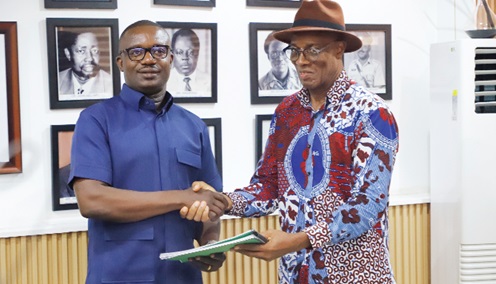
Private participation in ECG: Technical committee recommends 3 models
The technical committee tasked to advise on modalities for private sector participation in the distribution of electricity has recommended three models to inform the government’s decision on the effective implementation of the strategy.
The proposed models are entity concession involving giving the entire distribution to a private concessionor; multiple lease involving dividing the distribution into service parts, with each of them given to different private partners; and service franchise involving a private partner given the mandate to transfer the distribution services from source to homes.
These are contained in a report submitted by the Chairperson of the committee, Jabesh Amisah-Arthur, to the Minister of Energy and Green Transition, John Abdulai Jinapor, at the ministry in Accra last Wednesday.
Highlights
Giving highlights of the committee’s work, Mr Amisah-Arthur said 285 individuals and 35 organisations in the energy sector were engaged on the government’s intention to involve private sector participation in the energy distribution system.
He said the committee identified several challenges impeding the performance of the distribution of the utility.
These, he said, were management malaise, procurement problems, tariff gaps, high losses and widespread customer dissatisfaction with the services offered by the Electricity Company of Ghana (ECG), among others.
Recommendation
Receiving the report, the minister reiterated that the government would not sell any asset of ECG to a private entity, adding that “in all of this, you realise that there are no talks about the outright sale of ECG assets; they (ECG) will remain the asset owner”.
Going forward, the minister said, his office would present a proposition paper to Cabinet, and then a project implementation committee coupled with transaction advisers would be composed for a full roll out of the strategy using the best option.
He gave the assurance that the government would be transparent in every step of the way to ensure that emphasis was placed on local content participation in the distribution of utility to the public.
“What we are seeking to do is to reform the energy sector, increase revenue collection and ensure efficiency,” Mr Jinapor added.
On January 24, this year, the minister inaugurated the committee to oversee the incorporation of private sector participation in the distribution of electricity across the country as part of moves to transform the country’s energy sector.
The scope of the committee’s work was to focus on private investment in the ECG, the Ghana Grid Company (GRIDCo) and the Northern Electricity Distribution Company (NEDCo).
It was consequently tasked with designing a comprehensive and sustainable framework and model for private sector engagement, which would involve analysing existing distribution challenges, best practices and proposing an efficient, cost-effective and scalable model.
The committee, which was made up of energy experts and stakeholders in the sector, was also tasked to ensure that the model addressed critical issues such as infrastructure investment and customer satisfaction.
Other members of the committee were the Executive Director of the Africa Centre for Energy Policy (ACEP), Benjamin Boakye; a lecturer with extensive research in the upstream oil and gas sector, Dr Shafic Suleman; a representative of the Public Utilities Regulatory Commission (PURC), Dr Simon Akorli; Director of New Business and Risk Management of ECG, Ebenezer Baiden; a lawyer, Emma Akua Bulley; and an expert in the oil and gas sector, Edward Abrokwa.
